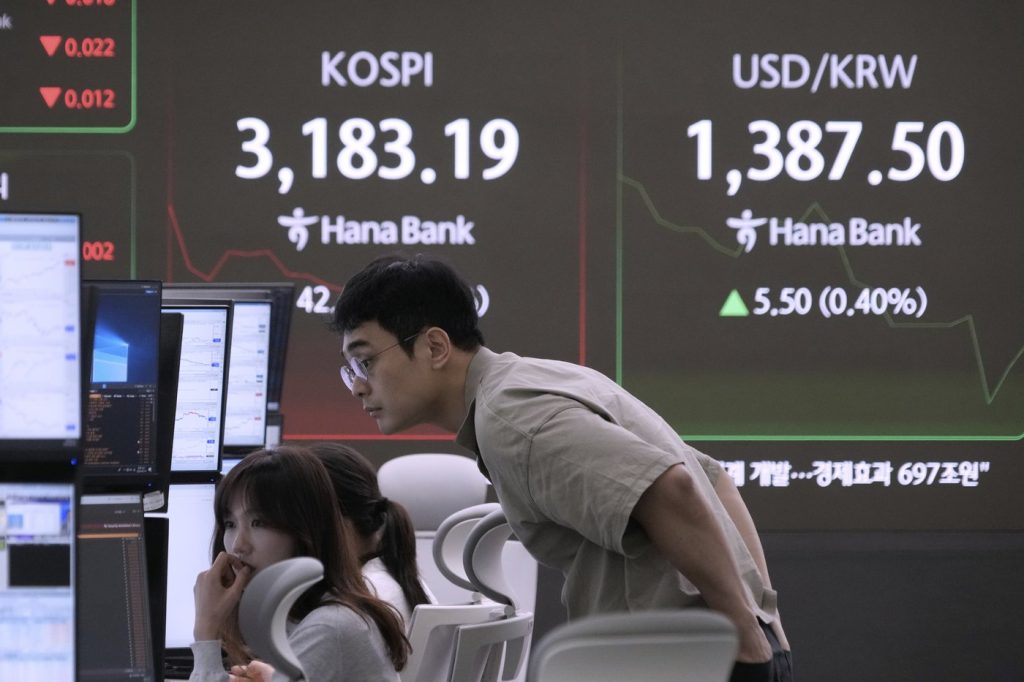TOKYO - Asian shares experienced a decline on Wednesday, largely reacting to a downturn in Wall Street, particularly among technology stocks like Nvidia, which has been at the forefront of the artificial intelligence (AI) surge. This trend has put pressure on other tech-heavy markets across the region.
In Japan, the benchmark Nikkei 225 index fell by 1.7%, closing at 42,787.28. The decrease followed a report indicating that exports from Japan have fallen slightly more than anticipated in July, a decline attributed to increased tariffs on goods exported to the United States. Computer-chip manufacturers bore the brunt of the selling pressure, with Advantest plunging 6.6%, Disco Corp. dropping 4.7%, and Tokyo Electron and Lasertec Corp. losing 1.9% and 1.8%, respectively.
Taiwan's Taiex suffered a significant 2.4% drop, primarily due to a 3.8% decline in shares of chip maker TSMC. In Hong Kong, the Hang Seng index slid by 0.6% to close at 24,980.20. Meanwhile, the Shanghai Composite index edged down by 0.1% to 3,725.22 after the People's Bank of China opted to maintain its benchmark interest rate, a move widely expected by the markets.
However, Australia’s S&P/ASX 200 saw a minor uptick of 0.2%, rising to 8,917.60. South Korea's Kospi, on the other hand, experienced a 1.4% drop, closing at 3,096.09. This decline came in the wake of North Korean leader Kim Jong Un’s condemnation of recent South Korean-U.S. military drills and his threats to enhance nuclear capabilities.
On Wall Street, the S&P 500 index declined by 0.6% to a value of 6,411.37, marking its third consecutive loss while remaining close to its all-time high achieved the previous week. The Dow Jones Industrial Average saw a minimal gain of less than 0.1%, closing at 44,922.27. In contrast, the Nasdaq composite fell sharply by 1.5%, ending at 21,314.95.
A significant contributor to the market's decline was Nvidia, whose stock plummeted by 3.5%. Nvidia’s chips play a vital role in the growing sector of AI technology. Another company heavily invested in AI, Palantir Technologies, saw its stock drop by 9.4%, marking the largest loss within the S&P 500. This downturn occurred amidst rising concerns that stock valuations have become excessive following a significant rally since April.
Continuing the trend of faltering tech stocks, Palantir's shares entered the day with a considerable year-to-date gain of 130%. The inflated prices of AI-related shares, coupled with fears over potential further restrictions in the chip industry, have motivated investors to adjust their portfolios.
Despite overall market losses, Home Depot managed to gain 3.2%, providing some support to the Dow. Although its quarterly results slightly missed analyst expectations, the retailer reported revenue growth and maintained previous forecasts for the year.
Looking ahead, all eyes will be on Jerome Powell, the chair of the Federal Reserve, as he is set to deliver a highly anticipated speech in Jackson Hole, Wyoming, on Friday. This location has been the backdrop for critical policy decisions by the Fed in the past, and there are hopes that Powell may signal impending cuts to interest rates.
The Fed has kept interest rates stable this year due to concerns that tariffs imposed by the Trump administration could drive up inflation. Recently, a disappointing jobs report has overshadowed these concerns, leading traders to widely anticipate a reduction in interest rates at the Fed's next meeting in September.
Elsewhere in the market on Wednesday, benchmark U.S. crude prices increased slightly, adding 12 cents to $61.89 per barrel, while Brent crude, the international standard, gained 11 cents to $65.90 per barrel. The U.S. dollar depreciated against the Japanese yen, reducing to 147.52 from 147.66. The euro also dropped in value, trading at $1.1636 compared to $1.1648 previously.











